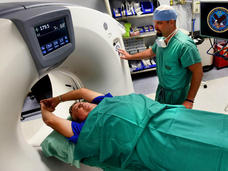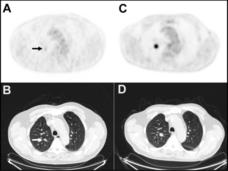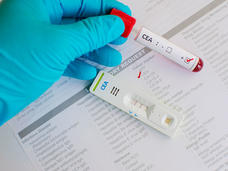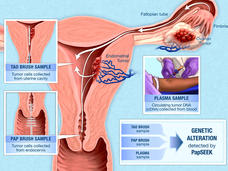Screening & Early Detection - Cancer Currents Blog
News about research on cancer screening and early detection. Includes stories on the impact of screening, new technologies, and approaches to improving the safety and efficacy of screening.
-
MGUS to Myeloma: Study Suggests Risk of Progression Can Change
A person’s risk of progressing from a benign condition called monoclonal gammopathy of undetermined significance (MGUS) to the blood cancer multiple myeloma can change over time, according to a new study.
-
Study Suggests Reviewing Lung Cancer Screening Criteria for African Americans
Clinical recommendations on who should be screened for lung cancer may need to be reviewed when it comes to African Americans who smoke, findings from a new study suggest.
-
Laser-Based Device Detects and Kills Melanoma Cells in the Blood, Study Finds
Researchers have developed a device that uses lasers and sound waves to scan circulating blood for melanoma cells. In a small study, the device accurately detected and reduced the amount of cancer cells in participants’ blood.
-
Metastatic Colorectal Cancer May Spread Early in the Disease, Study Finds
Many colorectal cancers likely have spread long before the original tumor is detected, researchers have found. The findings suggest the need for very early detection and could help identify patients who need more aggressive systemic treatments.
-
Could a Vaccine Prevent Colorectal Cancer in People with Lynch Syndrome?
Findings from an NCI-funded study suggest a new vaccine approach may have the potential to prevent colorectal cancer in people with Lynch syndrome, an inherited condition that increases an individual's risk for developing certain types of cancer.
-
After Lung Cancer Screening, Follow-Up Procedures May Be Riskier than Thought
In everyday medical care, there may be more complications from invasive diagnostic procedures performed after lung cancer screening than has been reported in large studies.
-
For Early-Stage Lung Cancer, Study Identifies Potential New Biomarker, Treatment Target
A new study has identified a potential biomarker of early-stage non–small cell lung cancer (NSCLC). The biomarker, the study’s leaders said, could help diagnose precancerous lung growths and early-stage lung cancers noninvasively and distinguish them from noncancerous growths.
-
Genomic Test Helps Identify Thyroid Nodules That Don’t Require Surgery
The test measures genomic changes in thyroid biopsy samples and generates a score based on how strongly each change is associated with thyroid cancer. A study showed the test accurately identified samples that, after surgery, were found to be benign.
-
For HPV-Positive Women, Test Can Guide Cervical Cancer Screening Follow-Up
A new test can help to improve the clinical management of women who screen positive for HPV infection during routine cervical cancer screening, an NCI-led study has shown.
-
Study Provides Closer Look at Postmenopausal Bleeding and Endometrial Cancer
A new study has found that 90% of postmenopausal women diagnosed with endometrial cancer reported vaginal bleeding before their diagnosis. Approximately 9% of postmenopausal women who saw a doctor for bleeding, the study showed, later received an endometrial cancer diagnosis.
-
Do Frequent Follow-Up Tests Benefit Colorectal Cancer Survivors?
Two studies examined the impact of more frequent follow-up testing for cancer recurrence in colorectal cancer survivors. Learn whether the studies showed that frequent testing improved survival.
-
Study Shows Experimental Screening Test Can Detect Endometrial and Ovarian Cancers
Scientists have struggled to come up with a simple test to detect endometrial and ovarian cancers early, when they are most likely to respond to treatment. Can a liquid biopsy test called PapSEEK change that?
-
Interactive App Improves Colorectal Cancer Screening Rates
Colorectal cancer screening reduces deaths from the disease, yet about one-third of Americans aren’t up to date with screening. Learn what happened when people waiting for routine checkups used an app that allowed them to order their own screening test.
-
Lung Cancer Screening Most Beneficial for Those at Highest Risk, Analysis Suggests
An analysis of data from a demonstration project led by the Veterans Health Administration may help to better define who is most likely to benefit from lung cancer screening.
-
Prior Cancers Common in Patients Newly Diagnosed with Cancer
A new study shows that many patients diagnosed with a new cancer have had one or more cancers in the past, which has potential implications for long-term surveillance and clinical trial enrollment.
-
Liquid Biopsy: Using DNA in Blood to Detect, Track, and Treat Cancer
Research studies show tests that analyze tumor DNA in blood, called liquid biopsies, may help detect cancer early, guide precision cancer treatment, and track treatment response.
-
TMIST Trial Aims to Provide Clarity on Breast Cancer Screening Approaches
A large nationwide clinical trial called TMIST has been launched to compare two techniques used for mammograms: tomosynthesis, often called 3D mammography, and standard 2D digital mammography.
-
Low-Tech Outreach Methods Improve Colorectal Cancer Screening
Proactive, low-tech outreach approaches can help increase the number of people who get screened for colorectal cancer with a colonoscopy or home stool test and complete the appropriate follow-up.
-
Dual-Biomarker Blood Test Shows Promise for Pancreatic Cancer Early Detection
A new blood test that measures levels of two specific proteins may be able to accurately detect pancreatic cancer at its earliest stages, when it is most likely to respond to treatment, findings from a new study suggest.
-
Biomarker Test Could Reduce Unnecessary Biopsies to Detect Prostate Cancer
Findings from a new study show testing for two biomarkers in urine may help some men avoid an unnecessary biopsy to detect a suspected prostate cancer.


















